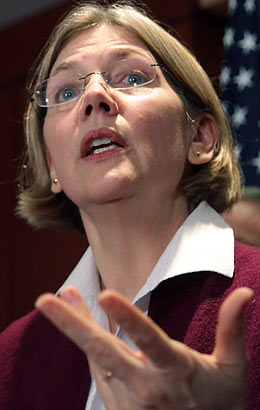
Who cares about the intricacies of mortgage-financing as long as you can get your own loan? And who has time to pay attention to the finer points of bankruptcy law, unless you have to file for it?
The answer, today's financial crisis has shown, is not nearly enough of us.
The same can't be said about Harvard Law School professor Elizabeth Warren. In recent months you may have seen Warren, 59, everywhere from The Daily Show to Dr. Phil, discussing in her inimitably unpretentious style her new job as chair of the TARP Congressional Oversight Committee, the outfit Congress put in charge of overseeing how the Treasury manages the $700 billion bank bailout. But long before toxic assets and credit-default swaps became household words, Warren was poking at the dark underbelly of the U.S. financial-services industry: predatory lending practices of banks and credit-card companies, home loans that borrowers had no hope of paying off and the endless efforts of financial-services companies to use their political clout to push the risks of reckless lending off lenders and onto borrowers.
I first met Warren when I hosted a blog for her and her HLS students to chronicle the progress of the 2005 Bankruptcy Bill, an atrocious piece of legislation rammed through Congress by many of the same banks and financial-services companies that were then in the process of driving the U.S. economy off the cliff. And today many of those same industry executives aren't happy with what remains her critical take on their practices. But Warren seems characteristically unfazed by the criticism. And thankfully so.
Marshall is the publisher of Talking Points Memo